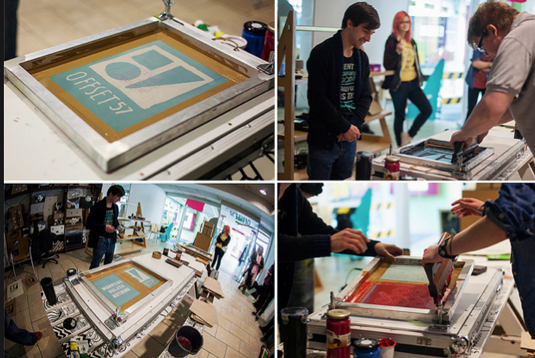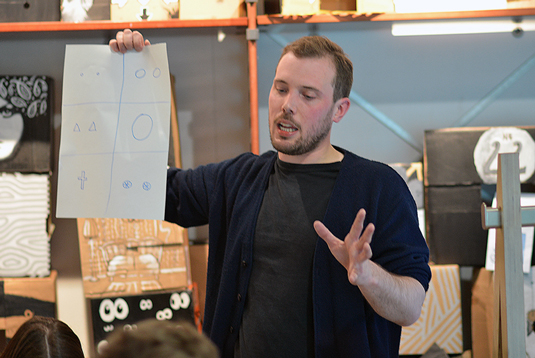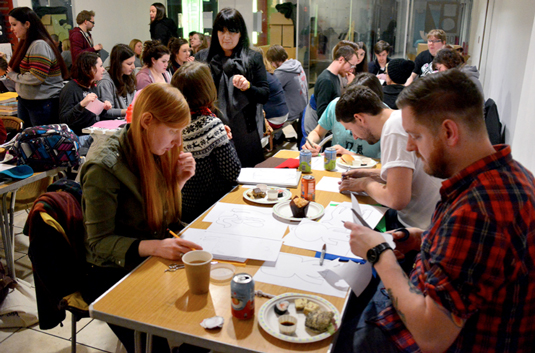How to organise a design event: 5 expert tips
Win friends and influence people by organising your own event. Nicola Watson of Aberdeen's Offset57 offers some handy tips.
Daily design news, reviews, how-tos and more, as picked by the editors.
You are now subscribed
Your newsletter sign-up was successful
Want to add more newsletters?

Five times a week
CreativeBloq
Your daily dose of creative inspiration: unmissable art, design and tech news, reviews, expert commentary and buying advice.

Once a week
By Design
The design newsletter from Creative Bloq, bringing you the latest news and inspiration from the worlds of graphic design, branding, typography and more.

Once a week
State of the Art
Our digital art newsletter is your go-to source for the latest news, trends, and inspiration from the worlds of art, illustration, 3D modelling, game design, animation, and beyond.

Seasonal (around events)
Brand Impact Awards
Make an impression. Sign up to learn more about this prestigious award scheme, which celebrates the best of branding.
Whether it involves running workshops, exhibiting work or putting together a degree show, organising a design event can be a fulfilling experience and brilliant for making new contacts, cross-fertilising design ideas and building on existing relationships.
But all those benefits only stem from a well-organised, successful event - and that's not at all easy to pull off. Running a series of events at Aberdeen's creative space Offset57, I've learned a few things about this subject, which I'd like to share with you here...
- Don't miss our guide to the Design Events of 2013!
01. Prepare thoroughly

It's important to be prepared and organised well in advance. Knowing everything about the space you're holding the event at will mean less stress on the day.
If you're booking experienced speakers, they'll expect you to be clued up. For example, when we booked illustrator Ben Newman to run a workshop at Offset57, he wanted to check our facilities beforehand, as well as ensuring his presentation would work on the computer he'd be using. All of our guests phoned and/or emailed to clarify queries way before the event date.
02. Attend to the details
Check everything again and again - and again! For example,
- Are names correct on any signage?
- Have you proof-read all publicity material?
- Do your guests have any specific requirements?
- Have you confirmed with catering?
- Have all deliveries arrived? And if not, do you have a back-up plan?
- Is the event space clean?
- Have you done a final health and safety check?
- Have you got enough of everything (guides, handouts, materials etc)?
When Louise Evans, aka Feltmistress, and Jonathan Edwards delivered their workshop at our event, Louise brought extra items and materials, just in case there were any overlooked details - superb forethought!
03. Timing

Consider when the event is held: lunchtime, afternoon, early evening? Who is your audience? When will they be available?
Daily design news, reviews, how-tos and more, as picked by the editors.
We chose to hold our talks in the early evening, as they were aimed at both current students and also our former students now working in the industry alongside their colleagues/peers. This allowed for people finishing work to head along straight away, and was a good way to wind down (which leads nicely on to tip number 04...).
04. Facilitate socialising
Allow for people to socialise prior to, during, or after the event (or even better, all three). This is where a lot of the communication and mingling happens and is often the main attraction for people coming to the event (networking trumps all!).
At Offset57, once the main event had finished we ensured our audience had a chance to chat informally with each guest. You usually gain more insight into the person and their work if it takes place in a more relaxed capacity. It can also lead to interesting connections, ideas and further discussions.
05. Learn, and improve

Accept advice: you don’t have to act on all of it, but I can guarantee you’ll learn something from most of it. Chat to your audience and guest speakers. Find out what worked and what didn’t and respond accordingly when you plan your next event.
At a degree show, try to speak to those who'll give honest and constructive opinions about your work. If it's an exhibition or talk, find out what requires improvement in terms of set up and aim to put this into practice for future occasions - but also ensure you keep doing the things that were noted as positives.
Often the best advice is the simple. Creative and educator Fred Deakin’s advice to us at Offset57 was, "keep doing it! The more you do, the more experience you gain, the more it improves."
Words: Nicola Watson
Nicola Watson initiated the non-profit pop-up shop/creative space Offset57 in Aberdeen, Scotland. Keep up with events at the venue on Twitter at @Offset57.
Liked this? Read these!
- Create a perfect mood board with these pro tips
- The best 3D movies of 2013
- Discover what's next for Augmented Reality
Have you organised a design event? We'd love to hear about your experiences in the comments below!

The Creative Bloq team is made up of a group of art and design enthusiasts, and has changed and evolved since Creative Bloq began back in 2012. The current website team consists of eight full-time members of staff: Editor Georgia Coggan, Deputy Editor Rosie Hilder, Ecommerce Editor Beren Neale, Senior News Editor Daniel Piper, Editor, Digital Art and 3D Ian Dean, Tech Reviews Editor Erlingur Einarsson, Ecommerce Writer Beth Nicholls and Staff Writer Natalie Fear, as well as a roster of freelancers from around the world. The ImagineFX magazine team also pitch in, ensuring that content from leading digital art publication ImagineFX is represented on Creative Bloq.
